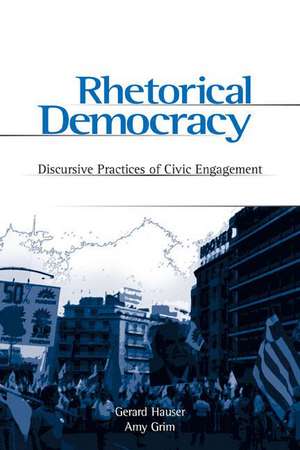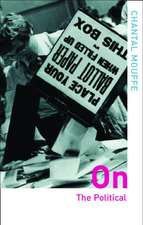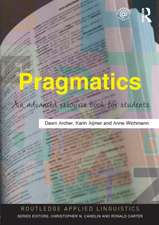Rhetorical Democracy: Discursive Practices of Civic Engagement
Editat de Gerard Hauser, Amy Grimen Limba Engleză Hardback – oct 2003
| Toate formatele și edițiile | Preț | Express |
|---|---|---|
| Paperback (1) | 443.23 lei 6-8 săpt. | |
| Taylor & Francis – oct 2003 | 443.23 lei 6-8 săpt. | |
| Hardback (1) | 1005.80 lei 6-8 săpt. | |
| Taylor & Francis – oct 2003 | 1005.80 lei 6-8 săpt. |
Preț: 1005.80 lei
Preț vechi: 1226.58 lei
-18% Nou
Puncte Express: 1509
Preț estimativ în valută:
192.49€ • 200.21$ • 158.91£
192.49€ • 200.21$ • 158.91£
Carte tipărită la comandă
Livrare economică 15-29 aprilie
Preluare comenzi: 021 569.72.76
Specificații
ISBN-13: 9780805842647
ISBN-10: 0805842640
Pagini: 334
Dimensiuni: 152 x 229 x 19 mm
Greutate: 0.61 kg
Ediția:New.
Editura: Taylor & Francis
Colecția Routledge
Locul publicării:Oxford, United Kingdom
ISBN-10: 0805842640
Pagini: 334
Dimensiuni: 152 x 229 x 19 mm
Greutate: 0.61 kg
Ediția:New.
Editura: Taylor & Francis
Colecția Routledge
Locul publicării:Oxford, United Kingdom
Public țintă
ProfessionalCuprins
Contents: Preface. G. Hauser, Rhetorical Democracy and Civic Engagement. Part I: Plenary Papers. B.E. Gronbeck, Citizen Voices in Cyberpolitical Culture. S.W. Logan, Identification and Resistance: Women's Civic Discourse Across the Color Line. R.A. Eberly, Plato's Shibboleth Delineations; or, the Complete Idiot's Guide to Rhetoric. H.W. Simons, The Temple Issues Forum: Innovations in Pedagogy for Civic Engagement. Part II: President's Panel: The Rhetoric of 9/11 and Its Aftermath. G. Hauser, Introduction to the President's Panel. F.A. Beer, Terrorist Rhetorics, Rhetorics of Democracies, and Worlds of Meaning. D.L. Cloud, The Triumph of Consolatory Ritual Over Deliberation Since 9/11. R.A. Eberly, Citizen Rhetorics After 9/11: Back to Bidness as Usual. M. Andrejevic, The Rehabilitation of Propaganda: Post-9/11 Media Coverage in the United States. J.A. Aune, Remarks for 9/11 Panel. R. Hariman, Public Culture and Public Stupidity Post-9/11. T. Farrell, Love and Theft After 9/11: Magnification in the Rhetorical Aftermath. Part III: Selected Papers. J. Blitefield, Populist Poetry or Rantum-Scantum? The Civil Disobedients of Poetry Slams. J. Carlacio, Alternative Articulations of Citizenship: The Written Discourse of a Nineteenth-Century African American Woman. J.R. Cox, The Rhetorical Display of "Publicness" in Global Institutions. A. Dobyns, Civil Disobedience and the Ethical Appeal of Self-Representation. T. Doherty, The Coalition Rhetoric of Rose Schneiderman. J. Ellis, Identity Across Blood Meridians. D.L. Emery, Defending the Public: Procedural Rationality and the Limits of Actually Existing Jurisprudence. D.C. Gore, Between Sympathy and Self-Interest: A Reframing of Adam Smith's Economic Rhetoric. R.W. Greene, The Concept of Global Citizenship in Michael Hardt and Antonio Negri's Empire: A Challenge to Three Ideas of Rhetorical Mediation. S. Hellman, Rhetoric of Globalization: A Social Movement Defines Its Collective Identity in America. D.B. Hingstman, Strategies of Objection in the Trial of the Chicago Eight. R.S. Iltis, Figuration of Moral Reform in the Rhetoric of Theodore Dwight Weld. S.B. Katz, The Alphabet as Ethics: A Rhetorical Basis for Moral Reality in Hebrew Letters. W. Keith, Dewey, Discussion, and Democracy in Speech Pedagogy. J.B. Killoran, Homepages, Blogs, and the Chronotopic Dimensions of Personal Civic (Dis-)Engagement. S.A. Klien, Civic Education and Republican Judgment: The Stem Cell Research Discourse of George W. Bush. B. Lain, Panoramic Memories: Realism, Agency, and the Remembrance of Japanese American Internment. J. Ludwig, Rhetorics of Subversion and Silence: The Naming of Illinois State University's Student Union. K.S. McAllister, Tyrannical Technology and Thin Democracy. M. Moghtader, How Medium Clarifies Message in Emerson's "Divinity School Address." R. Norgaard, Desire and Performance at the Classroom Door: Discursive Laminations of Academic and Civic Engagement. O. Ochieng, Sisyphus at Starbucks: Complicity Through Resistance in the Satire of Liberties. D.M. Oswald, Learning to Be Civil: Citizen Judith and Old English Culture. M. Parker, Memory, Narrative, and Myth in the Construction of National Identity: A Rhetorical Analysis of the Senate Debate Over Reparations for Japanese Americans. A. Pym, Oral Mind in Civic Engagement: Common Sense and Rhetorical Action. S. Romano, Fanaticism, Civil Society, and the Arts of Representation in Sixteenth-Century Mexico. J.B. Scott, Service-Learning and Cultural Studies: Toward a Hybrid Pedagogy of Rhetorical Intervention.
Descriere
This volume represents current theory and research in rhetoric, across disciplines, and is of interest to scholars and students in rhetoric studies in speech communication, English, and related disciplines.





















